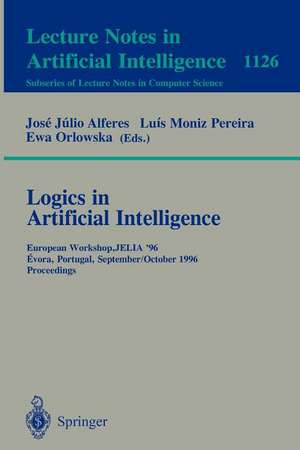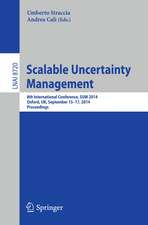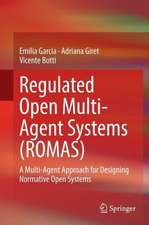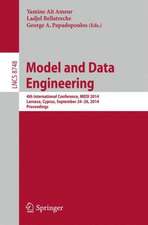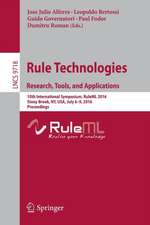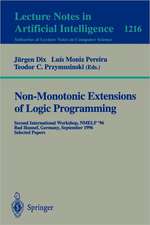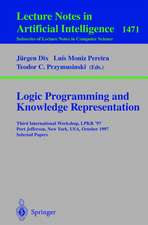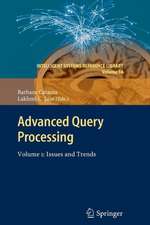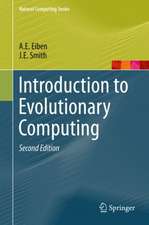Logics in Artificial Intelligence: European Workshop, JELIA '96, Evora, Portugal, September 30 - October 3, 1996, Proceedings: Lecture Notes in Computer Science, cartea 1126
Editat de Jose Julio Alferes, Luis Moniz Pereira, Eva Orlowskaen Limba Engleză Paperback – 28 aug 1996
The 25 revised full papers included together with three invited papers were selected from 57 submissions. Many relevant aspects of AI logics are addressed. The papers are organized in sections on automated reasoning, modal logics, applications, nonmonotonic reasoning, default logics, logic programming, temporal and spatial logics, and belief revision and paraconsistency.
Din seria Lecture Notes in Computer Science
- 20%
 Preț: 1061.55 lei
Preț: 1061.55 lei - 20%
 Preț: 307.71 lei
Preț: 307.71 lei - 20%
 Preț: 438.69 lei
Preț: 438.69 lei - 20%
 Preț: 579.30 lei
Preț: 579.30 lei -
 Preț: 410.88 lei
Preț: 410.88 lei - 17%
 Preț: 427.22 lei
Preț: 427.22 lei - 20%
 Preț: 596.46 lei
Preț: 596.46 lei - 15%
 Preț: 448.04 lei
Preț: 448.04 lei - 20%
 Preț: 353.50 lei
Preț: 353.50 lei -
 Preț: 389.49 lei
Preț: 389.49 lei - 20%
 Preț: 309.90 lei
Preț: 309.90 lei - 20%
 Preț: 645.28 lei
Preț: 645.28 lei - 20%
 Preț: 763.23 lei
Preț: 763.23 lei - 15%
 Preț: 580.46 lei
Preț: 580.46 lei - 20%
 Preț: 310.28 lei
Preț: 310.28 lei - 20%
 Preț: 655.02 lei
Preț: 655.02 lei - 20%
 Preț: 1183.14 lei
Preț: 1183.14 lei - 20%
 Preț: 340.32 lei
Preț: 340.32 lei -
 Preț: 449.57 lei
Preț: 449.57 lei - 20%
 Preț: 591.51 lei
Preț: 591.51 lei - 18%
 Preț: 938.83 lei
Preț: 938.83 lei - 20%
 Preț: 337.00 lei
Preț: 337.00 lei - 20%
 Preț: 649.50 lei
Preț: 649.50 lei - 20%
 Preț: 607.40 lei
Preț: 607.40 lei - 20%
 Preț: 1414.79 lei
Preț: 1414.79 lei - 20%
 Preț: 1024.44 lei
Preț: 1024.44 lei - 20%
 Preț: 583.40 lei
Preț: 583.40 lei - 20%
 Preț: 453.32 lei
Preț: 453.32 lei - 20%
 Preț: 575.49 lei
Preț: 575.49 lei - 20%
 Preț: 1075.26 lei
Preț: 1075.26 lei - 20%
 Preț: 585.88 lei
Preț: 585.88 lei - 20%
 Preț: 825.93 lei
Preț: 825.93 lei - 17%
 Preț: 360.20 lei
Preț: 360.20 lei - 20%
 Preț: 763.23 lei
Preț: 763.23 lei - 20%
 Preț: 340.32 lei
Preț: 340.32 lei - 20%
 Preț: 504.58 lei
Preț: 504.58 lei - 20%
 Preț: 369.13 lei
Preț: 369.13 lei - 20%
 Preț: 580.93 lei
Preț: 580.93 lei - 20%
 Preț: 343.62 lei
Preț: 343.62 lei - 20%
 Preț: 350.21 lei
Preț: 350.21 lei - 20%
 Preț: 583.40 lei
Preț: 583.40 lei - 20%
 Preț: 583.40 lei
Preț: 583.40 lei - 15%
 Preț: 438.59 lei
Preț: 438.59 lei - 20%
 Preț: 341.95 lei
Preț: 341.95 lei - 20%
 Preț: 238.01 lei
Preț: 238.01 lei - 20%
 Preț: 538.30 lei
Preț: 538.30 lei
Preț: 339.34 lei
Preț vechi: 424.17 lei
-20% Nou
Puncte Express: 509
Preț estimativ în valută:
64.93€ • 67.80$ • 53.62£
64.93€ • 67.80$ • 53.62£
Carte tipărită la comandă
Livrare economică 15-29 aprilie
Preluare comenzi: 021 569.72.76
Specificații
ISBN-13: 9783540616306
ISBN-10: 3540616306
Pagini: 436
Ilustrații: X, 426 p.
Dimensiuni: 155 x 235 x 27 mm
Greutate: 0.61 kg
Ediția:1996
Editura: Springer Berlin, Heidelberg
Colecția Springer
Seriile Lecture Notes in Computer Science, Lecture Notes in Artificial Intelligence
Locul publicării:Berlin, Heidelberg, Germany
ISBN-10: 3540616306
Pagini: 436
Ilustrații: X, 426 p.
Dimensiuni: 155 x 235 x 27 mm
Greutate: 0.61 kg
Ediția:1996
Editura: Springer Berlin, Heidelberg
Colecția Springer
Seriile Lecture Notes in Computer Science, Lecture Notes in Artificial Intelligence
Locul publicării:Berlin, Heidelberg, Germany
Public țintă
ResearchCuprins
Hyper tableaux.- An algorithm for the retrieval of unifiers from discrimination trees.- Building proofs or counterexamples by analogy in a resolution framework.- What you always wanted to know about rigid E-unification.- Labelled proofs for quantified modal logic.- A uniform tableaux method for nonmonotonic modal logics.- Design and implementation of diagnostic strategies using modal logic.- A modal action logic based framework for organization specification and analysis.- McCarthy's idea.- Strong and explicit negation in non-monotonic reasoning and logic programming.- Only persistence makes nonmonotonicity monotonous.- Ordering-based representations of rational inference.- Semi-representability of default theories in rational default logic.- A query answering algorithm for Lukaszewicz' general open default theory.- Infinitary default logic for specification of nonmonotonic reasoning.- A system for computing constrained default logic extensions.- The Oz programming model.- An abductive framework for negation in disjunctive logic programming.- Characterizing D-WFS: Confluence and iterated GCWA.- Modules and specifications.- Logic programming with integrity constraints.- Temporal reasoning over linear discrete time.- Similarity saturation for first order linear temporal logic with UNLESS.- Carving Up space: Steps towards construction of an absolutely complete theory of spatial regions.- Informational logic for automated reasoning.- Extensions for open default theories via the domain closure assumption.- Revising and updating using a back-up semantics.- A simple signed system for paraconsistent reasoning.
